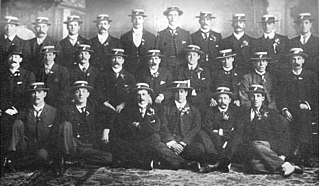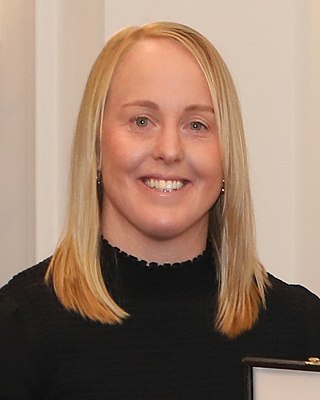Related Research Articles

The New Zealand national rugby union team, commonly known as the All Blacks, represents New Zealand in men's international rugby union, which is considered the country's national sport. Famed for their international success, the All Blacks have often been regarded as one of the most successful sports teams in history.

Wellington College, is a state-run boys secondary school in Wellington, New Zealand. It is situated on 12 hectares of green belt land in the suburb of Mount Victoria, in the vicinity of the Basin Reserve and Government House. The school was founded in 1867 through a deed of endowment from Sir George Grey, the then Governor of New Zealand.
Andrew Maxwell Haden was a New Zealand rugby union player and All Black captain. He played at lock for Auckland and New Zealand from 1972 until 1985. He also played club rugby in the United Kingdom and Italy.

New Zealand Rugby (NZR) is the governing body of rugby union in New Zealand. It was founded in 1892 as the New Zealand Rugby Football Union (NZRFU), 12 years after the first provincial unions in New Zealand. In 1949 it became an affiliate to the International Rugby Football Board, now known as World Rugby, the governing body of rugby union for the world. It dropped the word "Football" from its name in 2006. The brand name New Zealand Rugby was adopted in 2013. Officially, it is an incorporated society with the name New Zealand Rugby Union Incorporated.

Duncan McGregor, was a New Zealand rugby union and rugby league footballer. He was a member of the legendary 1905 Original All Blacks and later converted to rugby league when he went on the 1907 New Zealand league tour of Britain and Australia. He stayed in Britain following the 1907–08 tour, and opened a sport store as well as playing for Merthyr Tydfil RLFC. He returned to New Zealand after five years and continued to be involved in rugby league as an administrator and official.

The Buller Rugby Union (BRU) is a rugby union province based in the town of Westport, New Zealand. The Buller provincial boundary also includes other notable towns such as Reefton, Karamea, Granity, Charleston, Punakaiki and Murchison.
James Duncan was a New Zealand rugby union footballer, coach and referee. He captained New Zealand in its first test, and coached New Zealand in its first home test.

The National Rugby Union teams of England and New Zealand have been playing each other in test rugby since 1905, with the first meeting between the two nations being on 2 December 1905, when the All Blacks were in England as part of their European and North America Tour. The All Blacks won 15-0 with their points coming from five tries, of which four were scored by winger Duncan McGregor. Their next meeting was on the All Blacks Invincibles tour of 1924-25. The match was most notable for the sending off of All Black lock Cyril Brownlie, who became the first player to ever be sent off in a test match. In 1936 England defeated the All Blacks for the first time when England winger Prince Alexander Obolensky scored two tries during a 13–0 victory at Twickenham Stadium. The All Blacks have never lost more than two consecutive matches to England, and have dominated the rivalry between the teams. Of the 46 matches between them, New Zealand have won 36 and England 8, with two draws.
The 1972–73 New Zealand rugby union tour of the Britain, Ireland, France and North America was a collection of rugby union test match games undertaken by the All Blacks against England, Scotland, Wales, Ireland and France. The tour also took in several matches against British, Irish, French and North American club, county and invitational teams. This was the seventh tour of the Northern Hemisphere. It was also the first time the All Blacks lost to the invitational Barbarians team.

The 1903 New Zealand tour rugby to Australia was the fourth tour by the New Zealand national team to Australia. Nine matches were played against regional and district sides along with one test match between the two national sides, the first played by New Zealand in their history.

The 1907–1908 New Zealand rugby tour of Australia and Great Britain was made by a group of New Zealand rugby footballers who played matches in Australia, Ceylon, England and Wales between 1907 and 1908. Most of the matches were played under the rules of the Northern Union, a sport that is today known as rugby league. As such, the team were the immediate predecessors of the New Zealand national rugby league team. The tour had a large role in establishing rugby league in both Australia and New Zealand, and also gave birth to international rugby league. The tour party has come to be known as the professional All Blacks or All Golds, although at the time they were commonly referred to as the All Blacks—a named popularised by the New Zealand rugby union team that toured the Northern Hemisphere in 1905.
The 1975 Scotland rugby union tour of New Zealand was a series of seven matches played by the Scotland national rugby union team in New Zealand in May and June 1975. The Scotland team won four of their matches and lost the other three. They lost the only international match against the New Zealand national rugby union team in a game played in a downpour on a saturated pitch.
The 1982 Australia rugby union tour of New Zealand was a series of fourteen matches played by the Australia national rugby union team in New Zealand between July and September 1982. The Wallabies won ten of the fourteen matches and lost the other four. The international match series against the New Zealand national rugby union team resulted in a 2–1 win for New Zealand, who won the first and third matches, with Australia winning the second match. New Zealand thereby regained the Bledisloe Cup, which had been held by Australia since 1979.
Anthony Duncan Strachan is a former New Zealand rugby union player. A halfback, Strachan represented Otago, Auckland and North Harbour at a provincial level, and was a member of the New Zealand national side, the All Blacks, between 1992 and 1995. He played 17 matches for the All Blacks including 11 internationals.

Kendra Margaret Cocksedge is a retired New Zealand Rugby Union player and Cricketer. She played for the New Zealand Women's national rugby union side, the Black Ferns and for the Canterbury provincial side. She was a member of the 2010, 2017 and 2021 Rugby World Cup winning squads. In 2018 she won the Kelvin R Tremain Memorial Player of the Year Award at the annual New Zealand Rugby awards.
Duncan John Robertson is a former New Zealand rugby union player. He represented Otago at a provincial level, making 104 appearances and playing most of his games at second five-eighth. Robertson was a member of the New Zealand national side, the All Blacks, from 1973 to 1977, playing mostly as a first five-eighth, but also as a fullback towards the end of his career. He played 30 matches for the All Blacks including 10 internationals.

Duncan Alister Hales was a New Zealand rugby union player. A three-quarter, Hales represented Canterbury, Manawatu and, briefly, Hawke's Bay at a provincial level, and was a member of the New Zealand national side, the All Blacks, from 1972 to 1973. He played 27 matches for the All Blacks including four internationals.
References
- ↑ Knight, Lindsay. "Mick Duncan". New Zealand Rugby Union. Retrieved 12 February 2015.